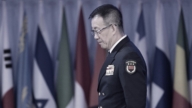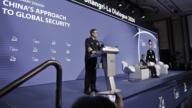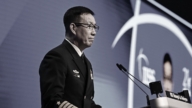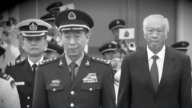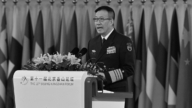【新唐人2013年11月19日讯】中共十八届三中全会除了决定所谓改革议题外,会后也决定了新的人事布局。其中,公告明确中纪委书记王歧山对地方政府和中央各部委的监控权,也就是变相的控制了中共官员的任命权。而“国家安全委员会”已基本确定由中共党魁习近平亲自挂帅担任组长﹔另一个“全面深化改革领导小组”,外界认为将由中共总理李克强兼任组长一职。王岐山和习近平、李克强构成铁三角,在中国社会公开亮相,中南海这三权结盟画出新的权力版图,与前党魁江泽民集团的搏击已经展开。
中共三中全会后,习近平阵营凭借成立“国家安全委员会”和“全面改革小组”,企图瓦解前党魁江泽民集团的政法委势力﹔同时,三中全会公告最显着的特点,在于突出中纪委书记王岐山的权力。
王歧山一年来在反腐中手段强硬,这次的公告明确宣布了他的监察地位,各级纪委被要求“加强同级别党委特别是常委会成员的监督”,而且推动纪委的双重领导。王岐山坐大中纪委书记,为总理李克强开路,习近平则以军权做后盾。
习近平在上任近一年后,在三中全会上彻底打破惯例,对江泽民阵营下手破局。习与前任总书记胡锦涛联手,第一次建立国家安全委员会,巩固自己权力,削弱政法委的实权。同时,三中全会废除了劳教制度,出台的各类政策,使得江派的利益进一步被挤压。
旅美中国社会问题研究人士张健:“习近平想做一些在自己的任期想做的事情的话,他一定要清除江派在政法委的势力,把国安会的成立,把政法委订在国安会里面,这是一个非常顺理成章的事情,这个事情来说,影响面是非常大的。”
隐藏在三中全会公告的一个信息就是,中南海习近平、王岐山、李克强结盟在舆论上完全公开,中南海这三权结盟正在与江泽民集团激烈搏击。
张健:“那么习、李政权现在上来之后,都没有很大的作为,包括只打苍蝇不打老虎,也是怨声载道,在这个新的结盟之后,还是以保党为主,搞经济为辅,搞经济只是一个幌子,保党是他的目地,在这个幌子下来达到他的目地,所以我相信他对江的人脉,进行这个顺我者昌、逆我者亡,这也是共产党党内斗争的一贯作法。”
时事评论员夏小强:“由于中共坚持一党专政,政治改革成为中共的禁忌,没有政治改革和民主政治体制下的经济改革,不可能成功。另外,中国的国家重要行业早已被以江泽民为代表的江家帮、太子党所瓜分和垄断,改革将会触动这些既得利益集团的利益。所以,李克强的经济改革措施,就要由中共党内的家法来实现。”
三中全会前,前中共中央政法委书记周永康在“中石油”的心腹,纷纷落马或被调查,包括原国资委主任蒋洁敏,及“中石油”系统4位实权高管——王永春、李华林、冉新权和王道富。
夏小强:“中共在三中全会上,竭力用所谓深化改革、加强市场经济、放权让利等表面动听辞汇来粉饰太平,掩盖危机。中共目前所采取的关于司法及劳教所、土地政策、国企、银行、国家文化安全等一切措施,背后都涉及政权黑洞,这些领域都隐藏巨大危机,中共是为挽救随时出现的政权垮台而采取这些措施。”
这次中共的三中全会设立了由习、李控制的“国家安全委员会”和“深化改革领导小组”,不仅涉及经济,还涉及军队、司法、党建等所谓“五位一体”的改革,因此也掌控了中共党、政、军、警、和经济大权。中共出现了近二十年里前所未有的集权。
采访/常春 编辑/黄亿美 后制/孙宁
Large Power Shifts in Chinese Communist Party During Third Plenary Session
It was announced that new personnel positions
were appointed during the Chinese Communist
Party (CCP) 18th Third Plenary Session.
Central Commission for Discipline Inspection
(CCDI) Secretary Wang Qishan was appointed to
monitor local governments and central ministries.
This appointment is thought to be a
disguised form of control within the Party.
It was also clearly determined that CCP leader Xi Jinping
will be personally heading the National Security Council.
International observers think Chinese Premier Li Keqiang
will lead comprehensive reforms of the leadership team.
A new power struggle for Zhongnanhai has started
between the ‘iron triangle’ created by Wang, Xi and Li,
and the faction led by former leader Jiang Zemin.
After the Third Plenary Session, it has become
apparent that Xi Jinping’s faction is attempting to
dissolve former CCP leader Jiang Zemin’s faction.
The Politics and Law Committee is now facing
the establishment of a ‘National Security Council’.
The Party leadership team is also
undergoing comprehensive reforms.
A significant move in this shift is the appointment
of new powers to CCDI Secretary Wang Qishan.
In the past year, Wang Qishan has
strengthened the anti-corruption campaign.
The new accouncement clearly places his
status as monitoring discipline at all levels.
Wang is to strengthen supervision of same level Party
committees, especially Standing Committee Members.
Wang has also pushed dual leadership of
the Commission for Discipline Inspection.
Wang Qishan has strengthened his power as CCDI
Secretary, and cleared the way for Li Keqiang.
Xi Jinping is using military power as his support.
During the time since Xi Jinping took power,
he has shifted the way the Party is functioning,
and is now splitting up Jiang Zemin’s faction.
Xi and former General Secretary Hu Jintao partnered
up, to firstly established the National Security Council.
This was to consolidate Xi’s power and weaken
the Politics and Law Committee’s power, then
controlled by Zhou Yongkang, in Jiang’s faction.
The Third Plenary Session was also used to superficially
abolish the system of re-education through forced labor.
It also tried to introduce various types of policies that
further tighten control of the interests of Jiang’s faction.
Zhang Jian, Chinese social expert: “If Xi wants
to achieve something, he must clear away
Jiang’s forces in the Politics and Law Committee.
Xi has established the National Security Council, and given
it superior power over the Politics and Law Committee.
This is a very obvious thing, and it has a very big impact.”
A hidden message in the Third Plenary outcomes
is that Xi Jinping, Wang Qishan and Li Keqiang’s
alliance is completely clear in the state media reports.
This alliance is engaged in fierce
infighting with the Jiang faction.
Zhang Jian: “After Xi and Li came
to power, there was no great action.
This new alliance is to protect the party,
and additionally engage in the economy.
The economy is only a pretext, but
the real goal is to protect the party.
The CCP’s usual infighting approach of ‘people who
follow me will prosper, and those who are against
me will perish’, is being applied to the Jiang faction.”
Xia Xiaoqiang, political commentator: “Since
the CCP upholds the one-party dictatorship,
political reform has become a taboo.
Without political and economic reforms under a
democratic political system, it cannot succeed.
China’s major industries have already been
divided and monopolized by Jiang’s faction.
Reforms will touch these vested interest groups.
Thus, Li Keqiang’s economic reform measures will
need domestic discipline in the CCP to achieve them.”
Before the Third Plenary Session, senior officials
in PetroChina were removed from their positions.
They were subsequently placed under investigation.
These officials were known henchmen of former CCP
Central Political Committee Secretary Zhou Yongkang.
This included Jiang Jiemin, former SASAC
director, and four officials Wang Yongchun,
Li Hualin, Ran Xinquan and Wang Daofu.
Xia Xiaoqiang, political commentator: “The Third Plenary
stressed deepening of reforms, the strengthening
of the market economy, and decentralization of power.
This was to cover up the huge crisis the party
is facing, but remains hidden in black holes.
These holes include the judicial system, labor camps,
land policies, state-owned enterprises , banks,
and all other national cultural security measures.
The CCP is using these measures to save
this regime, which could fall at any time.”
The establishment of the ‘National Security Council’
and a leadership team to oversee comprehensive
reforms does not only involve economics.
It also involves the military, judicial system, and party structure.
It therefore involves control over the party, political
system, police, military and economic powers.
The CCP has formed an unprecedented
centralization in the last two decades.




